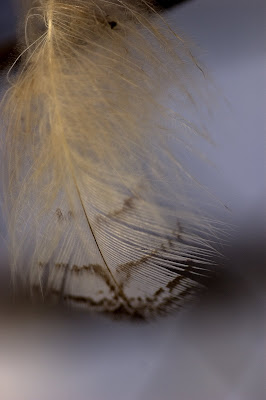Nightfall and cold rain. DK unplugged the window lights -- the Christmas lights, the hippie lights. True, they were burning 24/7, and, yes he did rightly cite the wastefulness of it all, this trickle of spark and light coming off the grid like water out of a leaky faucet. I stared at the dead strands inelegantly draped across the front window. It was depressing. Disheartening.
I liked the lights, the strand of white lights plugged into a strand of colored lights. From outside, the tiny lights looked like stars, doubled into 3-D by the windowglass. Tiny lights in engulfing darkness: vulnerable, mere, slightly ridiculous. Like a human, I suppose.

Inspired by DK's insistence on hewing to the proper decorative rubrics of the liturgical year, I finally threw my
Christingle away. DK, as you might imagine, had inquired about this residual bit of Christmasiana overstaying its welcome in our bedroom.
It had been sitting on my dresser since December. I liked the Christingle. I had defended its presence, explaining that, sure, it was decaying, but come Easter it would resurrect, bodily, into a plump, fragrant fruit.
Yeah, right, he replied. My theologian spouse. He can smell an Episcopal
blague, an uncanonical, DIY bit of doctrine a mile away.

The 4 wands of sweets -- gum drops, raisins and gummi bears -- looked fresh, but the orange was clearly failing. The red sash that had fit snugly around its waist sagged around its feet, the once-bright peel was hardening and darkening, and the bottom, where I'd stuck it into a candle holder, was mouldering. The candle was pristine white.
I thought for a minute about the light of Christ surviving in a decaying world, and threw the sad contraption into the trash.
I should have eaten it. A. -- the young, devout Indian man who brought the custom to our church -- had urged me to eat it, just as, a few weeks ago, he insisted I join in on some post-service meal rather than putter away in high altar guild mode.
Eating together, he reminded me, fellowship over food, was an important part of the early church. Not just the Eucharistic meal, but breakfast, lunch and dinner.
I demurred and puttered on, citing the church's equally important tradition of anchoresses and anchorites.
Potluck, soup and bread, Shrove Tuesday Pancakes, youth group breakfast: there is no dearth of table fellowship in my church. I am more on the Simone Weil end of the religious food spectrum, the look and don't eat end. Weil, intensely, longingly attracted to Christ, refused Baptism (and consequently a place at the Eucharist table) because of the Church's two famous Inquisitional words --
anathema sit -- the exclusionary, excommunicating pronouncement against a heretic. Weil, like Christ, identified with the outsider. To her, exclusion was anathema. She preferred to be with the outcasts.

Thinking of her strict witness, I feel a twinge of shame. My church continues to exclude a whole class of people from participating in its full, sacramental life. The Presiding Bishop asks for a "season of fasting" from proceeding with inclusion. The Archbishop of Canterbury bans a duly elected Episcopal Bishop from Lambeth. The rhetoric -- some of it -- is soothing, eloquent, pious, complicated. One longs for a Jeremiah, or an Amos.
Cut, in other words, the crap.
Should I give up the Eucharist for Lent ? Now there's an interesting thought.

I tried to give up soy ice cream for Lent last year. I lasted three days. When I proposed to try again this year, DK, theologian in residence, weighed in.
No, no, don't give that up. Give up something else. Like bacon.I, vegan, laughed.
Jesus would see right through that.No he wouldn't -- Jesus loves bacon ! I winced and shook my head.
OK, then how about asparagus ? he countered.
I laughed again.
We eat asparagus about twice a year. What kind of discipline would that represent ?DK chuckled.
Discipline. Oh, I get it -- you secretly want to be one of those Christians who go around flogging themselves ! He made flagellant gestures in the doorway of my room.

Meanwhile, in the window of my study, concealed behind my computer monitor, my two, battery-powered, LED-based, auto-timed, flickering Christmas candles still shudder on at nightfall, first the left then the right, epistle then gospel, as if lit by an invisible acolyte.

There are secrets in every marriage.































